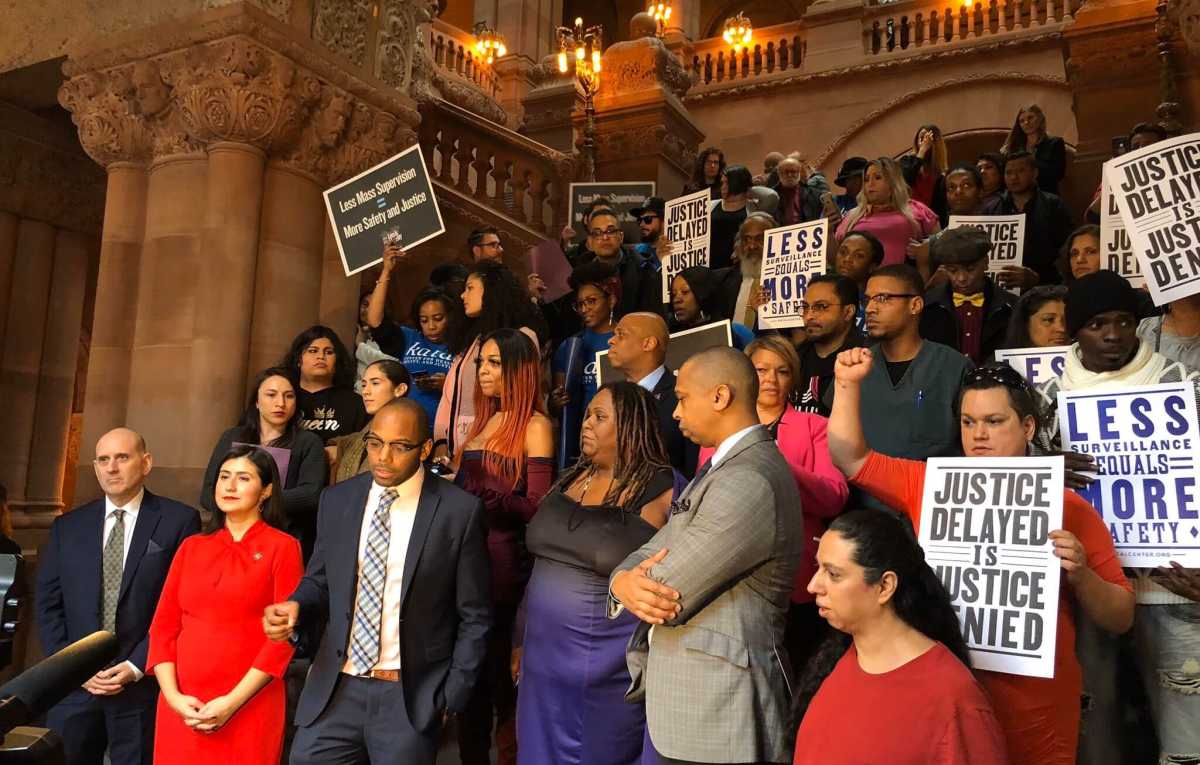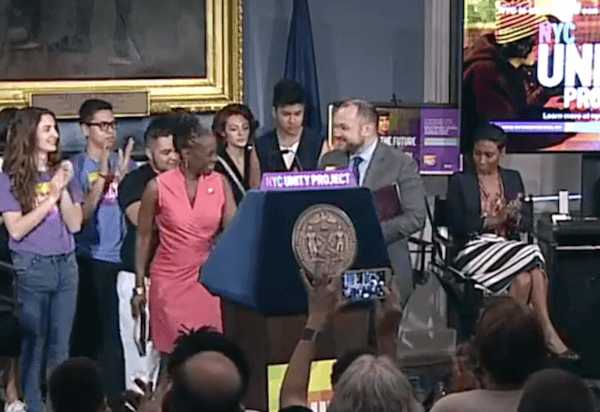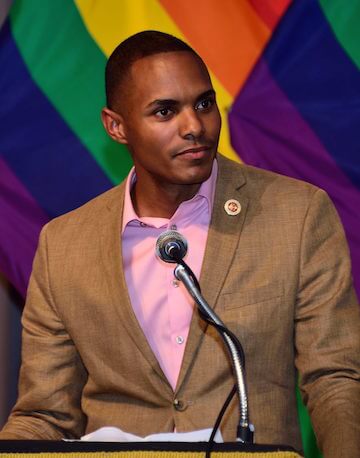Advocates for sex work decriminalization in New York are at least temporarily putting their comprehensive decriminalization bill on the backburner in favor of a more limited, but more attainable goal of convincing lawmakers to repeal a discriminatory loitering law that has long targeted transgender women of color.
Several groups ranging from VOCAL-NY to Gay Men’s Health Crisis (GMHC) flocked to Albany on January 28 for a day of lobbying that included rallies calling on state elected officials to repeal the ban on “walking while trans” and legalize marijuana in a way that reinvests in communities of color impacted by the drug war.
Advocates are feeling confident in their chances of sealing the deal on their longstanding effort to gut the “walking while trans” ban — section 240.37 of the penal law — especially because that repeal effort has the backing of advocates who support the Nordic Model or so-called Equality Model, which would only remove criminal penalties for sex workers but not for buyers or those who facilitate sex work.
While the comprehensive sex work decriminalization bill unveiled last year would remove criminal penalties for all those engaged in the consensual sex trade, this repeal effort — which reached the Assembly floor last year but stalled in the Senate Codes Committee — would only remove the section of the penal code that has given cops broad leeway to stop individuals simply because they are walking down the street or wearing certain types of clothing, among other bogus factors. Last year, the NYPD updated its patrol guide to stop targeting people on the basis of “gender, gender identity, clothing, and location.”
“The reason why [repealing] ‘walking while trans’ is at the forefront is because it is a bill that should have never been created and never been passed,” Black Youth Project 100 policy and advocacy manager Saye Joseph, who is among the leading advocates on the issue, said in a phone interview on January 28. “And it can pass this session, whereas the larger conversation around decriminalization of sex work will require a lot more political education.”
That education effort, while still rather new, kicked into high gear when the DecrimNY coalition to decriminalize sex work launched in February of last year. Even after the legislative session, DecrimNY members regrouped and started canvassing in different parts of the city to explain to locals why full decriminalization would be safer for everyone. They also placed art on wooden street placards to show that sex workers are harmless neighbors simply trying to carry out their work.
Those education initiatives are at least starting to pay off. A new nationwide poll is showing growing support for full sex work decriminalization, even across party lines and different age demographics.
But the focus in New York State, at least for now, remains squarely on taking care of the “walking while trans” repeal. GMHC policy associate Brian Romero, one of the top voices involved in the movement to repeal the loitering law, said advocates hope this spotlight on the loitering law can help avoid any confusion between the two measures.
“We knew from last session that both bills would be conflated,” Romero said. “So this is an attempt to really give the [“walking while trans” repeal] bill its own platform.”
That spotlight on the loitering law has attracted pledges from top prosecutors in several boroughs. Manhattan District Attorney Cy Vance on January 28 tweeted an endorsement of the repeal effort and Bronx District Attorney Darcel Clark noted in her “A Safer Bronx through Fair Justice” platform this year that she has instructed her team to stop prosecuting that loitering law.
Governor Andrew Cuomo’s office did not return requests for comment on the effort to repeal the loitering law and a spokesperson for the governor told the Queens Eagle that “we would have to review the final bill.” On a separate but related note, that response was similar to the one Cuomo offered to WAMC public radio last year when he was asked about the comprehensive decriminalization bill known as Stop Violence in the Sex Trades Act. He said that bill, which was unveiled in June just days before he was asked about it, “is going to be a controversial issue,” but he otherwise said, “I haven’t read the bill and I haven’t studied the bill.”
There are also other related initiatives that lawmakers believe could pass this session, such as a measure vacating sex work-related convictions for sex trafficking victims. State Assemblymember Richard Gottfried of Manhattan, who is prime sponsor on the measure to vacate convictions and is co-sponsor of the bill to repeal the loitering law, is maintaining a positive outlook.
“Advocacy around this issue is getting stronger,” Gottfried told Gay City News in a written statement. “A diverse coalition of advocates has been highlighting the injustice of the current [loitering law]. There is also increasing support for my bill for trafficking survivors to vacate a broader range of convictions resulting from them being trafficked. With a long list of co-sponsors in both the Assembly and Senate, I’m optimistic we can get these done this session.”
Out gay State Senator Brad Hoylman of Manhattan has long backed the “walking while trans” repeal and co-sponsors the legislation to provide relief for trafficking survivors. He reiterated his support for the legislation in a written statement to Gay City News on January 29.
“The seemingly endless epidemic of violence and harassment against trans women must end, which is why Albany must repeal the section of the law that bans ‘Walking While Trans,’” he said. “With renewed support from the LGBTQ community, anti-human trafficking groups, progressive activists, and district attorneys, I’m hopeful we can address this important issue this year.”
Hoylman did not, however, answer a question about whether he would support full decriminalization bill should that again become a priority of advocates down the line. He has curiously appeared to tone down his rhetoric on full decriminalization efforts as of late — at least compared to last February, when he tweeted that “decriminalization is critical to protecting the rights and safety of people who trade sex, no matter where they are on the spectrum of choice, circumstance, and coercion.” He did not sign on as a sponsor to the full decriminalization bill.
Queens State Senator Jessica Ramos, a vociferous supporter of comprehensive sex work reforms who signed on to the full decriminalization bill in the upper chamber alongside State Senators Robert Jackson of Manhattan and Luis Sepúlveda of the Bronx, did not return requests for comment for this story.
Meanwhile, a spokesperson for New Yorkers for the Equality Model coalition told the Queens Eagle that the group “wholeheartedly” supports the loitering repeal effort — a positive sign for all sides hoping to move the needle on that legislation. That group did not respond to Gay City News’ request for comment.
Still, while those group’s support is welcomed by full decriminalization advocates now, the influence of those who only support the Equality Model raises questions about the longer-term path forward for future decriminalization efforts. Gay City News reported in September that government officials from Sweden and France mounted a lobbying effort during which they met with Brooklyn Assemblymember Tremaine Wright and Manhattan State Senator Liz Krueger to discuss “how to advance the Equality model at NY state level.” Krueger and Wright reportedly agreed to propose a bill in New York State mirroring a form of the Equality Model.
Ultimately, advocates are realizing that broad support — even from those who reject full decriminalization — is crucial to whipping the votes necessary to pass a no-brainer loitering repeal bill that would immediately have an impact on communities most negatively affected by it.
“Even with attempts to roll back bail reform, this bill has less opposition and this is a way to uplift marginalized communities,” GMHC’s Romero said. “We strongly believe that this bill should be a priority issue and can pass this session.”



































